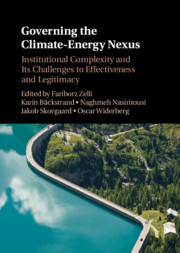Global climate and energy governance increasingly intersect. Transformation in the consumption and production of energy across developing and developed countries is key to setting the world on a low-carbon path. It therefore makes sense, as we argue in this book, to talk about a global climate-energy nexus. This nexus consists of a plethora of international institutions that govern numerous policy fields, such as renewable energy, fossil fuel subsidies, and carbon pricing. These issues, and the institutions that govern them, all have far-reaching consequences for climate change and energy use, and thereby for the future world we live in.
Many of these institutions overlap in their mandates and memberships of governments and nongovernmental actors, while they exercise different governance functions. All this leads to a high degree of institutional complexity across the climate-energy nexus. We lack a deeper understanding of the shapes of this complexity, and of its crucial consequences for the legitimacy and effectiveness of the governance arrangements that are operating therein.
This book provides essential answers to these research gaps. It conceptualizes the governance of the climate-energy nexus and presents novel empirical findings through carefully crafted comparative case studies that combine different methodologies in an innovative way.
The volume is the outcome of a four-year international research project on Challenges and Opportunities in a Fragmented Global Energy and Climate Governance 2015–2018 (CLIMENGO), funded by the Swedish Energy Agency (SEA). Coordinated by Karin Bäckstrand at Stockholm University, with collaborative partners at Lund University and Vrije University Amsterdam, it has united leading experts in the fields of energy and climate governance. We are immensely grateful to the SEA for giving us the opportunity to carry out the important and innovative research that we present in this book. We are also thankful for the possibility to present our research at the annual SEA conferences, and we are particularly indebted to Marie Carlberg, Klaus Hammes, Josefin Thoresson, and Maria Vuorelma.
The idea to produce a joint edited volume arose in early 2018. In June 2018, we could already discuss first draft chapters at a two-day workshop, which was kindly hosted by Harro van Asselt and Cleo Verkuijl at the Oxford branch of the Stockholm Environment Institute. The process of writing this book over the following year has been a stimulating, fruitful, and intense academic journey and conversation, which has cut across and bridged different scholarly fields such as international relations, environmental politics, law, geography, and environmental sciences. We presented our revised book chapters in a panel organized at the annual meeting of International Studies Association (ISA) in Toronto in March 2019 and want to express our gratitude to our discussant Matt Hoffmann from the University of Toronto. He provided extremely useful and excellent feedback that helped us to enhance the contributions to this book during the final steps before the submission of our manuscript.
As editors, we have been privileged to work with an exceptional group of authors who have contributed to this volume: Jana Canavan, Phillip Pattberg, Lisa Sanderink, Harro van Asselt, Cleo Verkuijl, and Soetkin Verhaegen. We extend our sincere gratitude to them for their collegial spirit, critical input, helpful advice, and tremendous patience – not only with respect to their own chapters, but for all of their invaluable support in improving the quality of the entire book.
Likewise, this volume would not have been possible without the helpful input from a wide range of people. This begins with the editorial team at Cambridge University Press, in particular Lisa Bonvissuto, Sarah Lambert, and Matt Lloyd, who have supported us with their great dedication and guidance throughout all the production phases of this volume. We also want to take this opportunity to thank the three reviewers for Cambridge University Press. They challenged us to further clarify and sharpen the book’s theoretical, methodological, and empirical added value, helping us to advance the research frontier on the climate-energy nexus.
Moreover, we would like to express our thanks to a number of colleagues, who have dedicated their time to provide valuable feedback at various stages over the past four years. They all helped us to make significant progress in our research project and to accomplish this volume. This includes Jonas Tallberg and Lisa Dellmuth of the University of Stockholm, who offered constructive comments on the legitimacy aspects of institutional complexity. A special thanks goes to two persons who were involved in the early stages of the project as well as the application phase: Daniel Stenson Engström at the Swedish Environmental Protection Agency, and Jonathan Kuyper at Queens University Belfast. Other colleagues have contributed in various ways to specific chapters, notably Jasmiini Pylkkänen from the University of Oulu.
Finally, we are indebted to our research assistant Hugo Faber at Stockholm University, whose dedicated and meticulous editorial assistance as well as interview transcriptions were invaluable.
As editors, we take full responsibility for any errors or omissions remaining in the book.



